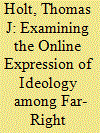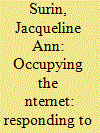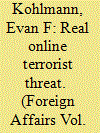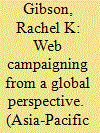|
|
|
Sort Order |
|
|
|
Items / Page
|
|
|
|
|
|
|
| Srl | Item |
| 1 |
ID:
188035


|
|
|
|
|
| Summary/Abstract |
Over the last decade, there has been an increased focus among researchers on the role of the Internet among actors and groups across the political and ideological spectrum. There has been particular emphasis on the ways that far-right extremists utilize forums and social media to express ideological beliefs through sites affiliated with real-world extremist groups and unaffiliated websites. The majority of research has used qualitative assessments or quantitative analyses of keywords to assess the extent of specific messages. Few have considered the breadth of extremist ideologies expressed among participants so as to quantify the proportion of beliefs espoused by participants. This study addressed this gap in the literature through a content analysis of over 18,000 posts from eight far-right extremist forums operating online. The findings demonstrated that the most prevalent ideological sentiments expressed in users’ posts involved anti-minority comments, though they represent a small proportion of all posts made in the sample. Additionally, users expressed associations to far-right extremist ideologies through their usernames, signatures, and images associated with their accounts. The implications of this analysis for policy and practice to disrupt extremist movements were discussed in detail.
|
|
|
|
|
|
|
|
|
|
|
|
|
|
|
|
| 2 |
ID:
068683


|
|
|
| 3 |
ID:
159370


|
|
|
|
|
| Summary/Abstract |
This article considers the use of emoticons on transnational, English-language Islamic website forums as a case study to examine the shifts in Sunni religious authority, which have accelerated and deepened in the era of computation and new media. It shows the ways in which ordinary Muslims on conservative web forums invoke, deploy, and respond to different kinds of authority, from jurists to site administrators. It focuses first on particular websites’ endorsement of certain emoticons as Islamic (a smiley face with a hijab, e.g.), and then turns to forum users’ debates about emoticon usage. These debates range from questioning the acceptability of figural emoticons to the appropriateness of ‘secular’ emoticons on self-identified Islamic websites. It finds that while users often cite or request fatawa on emoticon usage when disputing with others, they are equally likely to post what they consider relevant hadith, appeal to common sense, or appeal to site administrators. This ground-up approach to engaging with the issue of emoticons gives nuance to what some scholars have termed the “crisis of authority” in Sunni Islam, and suggests that ordinary Muslims find authority in a diverse, sometimes contentious spectrum of locations. Far from being irrelevant to scholarship on contemporary Islam, emoticons are an important locus for understanding how pious Muslims have negotiated interactions in online spaces.
|
|
|
|
|
|
|
|
|
|
|
|
|
|
|
|
| 4 |
ID:
094953


|
|
|
|
|
| Publication |
2010.
|
| Summary/Abstract |
This paper examines how the internet and information communication technology have resulted in a shift in power with regard to who defines and controls content for consumption. Individuals can now take on established institutions in defining and constructing reality; and with the much lower entry point for just about anybody to be a publisher, the traditional media are being contested as never before. At the same time, this shift in power has meant it is also easier to hold media accountable-not a bad thing at all for democracy.
|
|
|
|
|
|
|
|
|
|
|
|
|
|
|
|
| 5 |
ID:
106696


|
|
|
|
|
| Publication |
2011.
|
| Summary/Abstract |
In this article, I address piety as a concept shaping Muslim women's online discussions about gender roles, marriage and professional careers. I also investigate cross-cultural religious encounters in these women-only groups as I am interested in the potential of such online environments to facilitate women's religious reflection and intellectual engagement. Finally, I explore motivations and religious interpretations of three categories of participants in these discussions: egalitarians, for whom gender equality is a necessary component of piety (Barlas 2006); traditionalists, identified by other authors as Islamists (Karam 1998) or social conservatives (Gül and Gül 48:1-26, 2000; Mahmood 2005) and finally, holists, a group that cannot be mapped out on the political landscape by using the progressive-conservative binary (Badran, Agenda 50:41-57, 2001) and which exists and acts outside of it, neither subverting nor enacting norms of any dominant system, be it secular-liberal or patriarchal. Following Mahmood's argument that formulating an analysis based exclusively on such a binary is simplistic (Mahmood 2005), I argue that actions of holists can be only addressed by formulating a set of questions different to those used to analyse self-defined egalitarians or traditionalists.
|
|
|
|
|
|
|
|
|
|
|
|
|
|
|
|
| 6 |
ID:
106442


|
|
|
|
|
| Publication |
2011.
|
| Summary/Abstract |
What career information do potential military recruits seek? The Internet increasingly provides a medium for advertising and communication with recruiters and other potential recruits. The authors explored the influence of online information on enlistment decision making. Analysis of recent Army new recruit surveys showed that a sizable proportion of recruits have encountered military advertising or sought recruiting information online. The authors also examined online discussion forums-in which soldiers and prospective soldiers ask questions, trade insights, and vent frustrations-for postings indicating information seeking for enlistment decision making. Potential recruits were most interested in recruiting processes and what to expect from a military lifestyle, seeking opinions and details on job functions, duty stations, and benefits. These findings suggest that potential recruits may seek information online when unable or unwilling to find it from military websites or talking to recruiters.
|
|
|
|
|
|
|
|
|
|
|
|
|
|
|
|
| 7 |
ID:
073515


|
|
|
|
|
| Publication |
2006.
|
| Summary/Abstract |
Fears of a "digital Pearl Harbor" -- a cyberattack against critical infrastructure -- have so preoccupied Western governments that they have neglected to recognize that terrorists actually use the Internet as a tool for organizing, recruiting, and fundraising. Their online activities offer a window onto their methods, ideas, and plans.
|
|
|
|
|
|
|
|
|
|
|
|
|
|
|
|
| 8 |
ID:
120821


|
|
|
|
|
| Publication |
2013.
|
| Summary/Abstract |
Classroom simulations are a well-known tool in learner-centered education, and in the field of international relations, simulations have been utilized for years to stimulate student learning. The literature has shown that simulations encourage active learning and retention of information; however, there are challenges with conducting simulations online, and the tool has been relatively underdeveloped. While there are commercial online simulations, there has been less research on the effectiveness of various approaches, particularly in classes that are completely online, with simulations entirely designed and implemented by faculty. This paper reviews some of the literature on simulations, hybrid and online, creates a design framework from the literature and analyzes a simulation implemented in an online mixed graduate/undergraduate regional studies political science class. Results showed positive learning and feedback from the students; however, several features will be changed in the simulation design to improve future simulations. Further, suggestions will be offered on how this type of simulation can be tailored for different courses.
|
|
|
|
|
|
|
|
|
|
|
|
|
|
|
|
| 9 |
ID:
051902


|
|
|
|
|
|
|
|